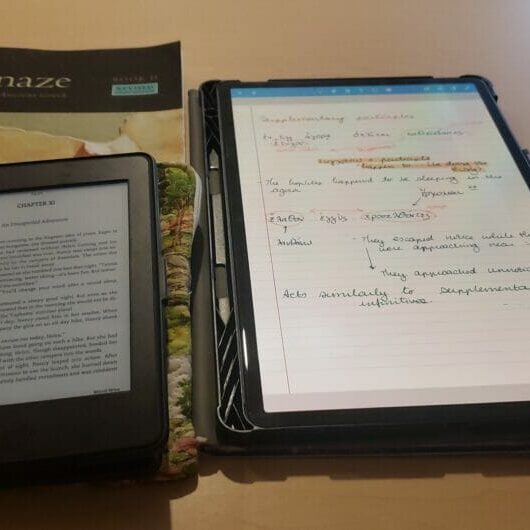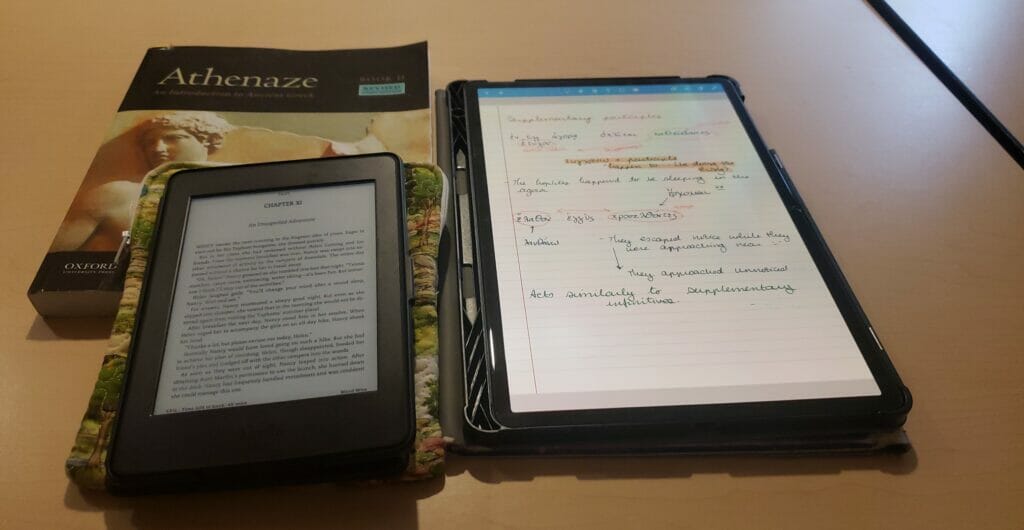
Books have been a part of the world for thousands of years. The first books were written on papyrus scrolls in ancient Egypt. As the world evolves, so has reading. It’s no surprise books are available digitally. Accessibility is important, but not everyone likes reading from a screen. Are e-books changing reading for better or worse?
I remember how excited I was to receive my first Kindle e-reader at age 12. Amazon had just released them and I was glad not to lug my books everywhere I went. The Kindle made for discreet reading sessions during class and more space in carry-on baggage on flights.
I didn’t need to worry about how many books to bring on holidays anymore. They were all condensed into my Kindle and life was good.
As with most new things, the novelty wore off.
Losing tangibility, losing the story
The metallic touch and smell of my e-reader felt alien after a while. There was something about the lightness of the Kindle that reduced the gravity of a novel. I couldn’t feel the weight of the protagonist’s journey anymore.
At this point, however, I relied on the portability of my Kindle. When Amazon released the Kindle app for tablets and smartphones, my load decreased further. I didn’t need the e-reader, but I still felt like something was missing from each story I read.
When I finally caved and bought a print book again, the first thing I did was smell it. It was so completely different from the thin metal thing I’d grown accustomed to reading with. The gravity of the story felt restored by the physical act of turning the page. My heroes were back, but it came at a cost.

Weighing cost and content with e-books
It wasn’t until I started buying my own books that I understood the economy of the e-book. Print isn’t cheap.
My dream of having my own Disney’s Belle-style library slowly faded away as the price of print books increased. Suddenly, I wasn’t bothered if books weren’t paper. I’d rather have them digitally than not at all.
It wasn’t until I finished my first year at Dalhousie Univeristy that I began to wish all textbooks were available as e-books.
The costs of textbooks always seemed high to me, but inflation has made them feel unobtainable. In 2021, the cost of paper increased 10 to 12 per cent, with more hikes expected.
I know staring at a screen causes headaches for some people. The harsh backlight isn’t fun to have glaring at you while trying to digest information. A 2017 study found readers experienced significantly less eyestrain reading print books compared to reading on an iPad. Despite that, I still believe more course books should be digital.
Textbooks are heavy, especially when hauling them around for multiple classes. As for iPads or other electronic devices, they’re more environmentally friendly compared to having ridiculously large course books printed en masse.
According to Forbes, the average tree can supply enough materials to manufacture approximately 20 books. With an 8.5 per cent increase in print sales in the United States, an additional 41.2 million trees need to be chopped down. Making the shift to e-books might be the right way to go for the environment’s sake.
Accessibility for students
The argument for digital textbooks goes beyond money and a greener tomorrow. Digital features make course books more accessible to students who learn in unconventional ways.
Plenty of students type or handwrite notes on a tablet. Others use voice-to-text features to express thoughts more easily articulated through speech than writing. It makes sense to condense everything digitally to simplify this process in the future.
Digital textbooks assist the visually impaired and those who find reading downright tedious or painful with text-to-speech reader functions.
I have a friend whose favourite pastime might have been reading if not for her severe dyslexia. I remember her listening to me ramble about my most recent book and hearing how much she wished she could read without actually reading. When audiobooks became easily accessible, she finally got to read without the process feeling torturous.
Print reading is a preference
I think it all comes down to preference. What works best for your circumstances dictates that preference. Of course, those who grew up with physical print books might prefer them over e-books, but that doesn’t negate the advantages of e-books.
I view it much like the evolution of music. Our parents may prefer CDs, cassettes or vinyl. That doesn’t stop them from enjoying music on Spotify.
In the end, print books aren’t going extinct and they likely never will. They’re just becoming less affordable and accessible than e-books. Like vinyl records, they’re a richer version of the same content, but digital just makes sense.






